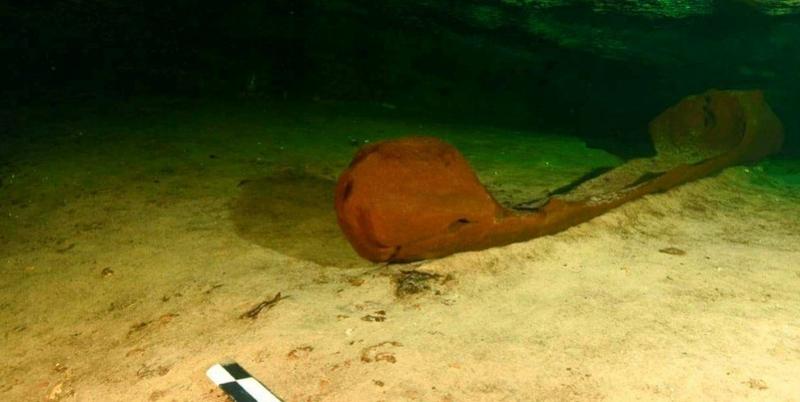Archaeologists have found an ancient canoe in a flooded karst cave on the Yucatan Peninsula in southern Mexico, believed to be more than 1,000 years old and almost completely preserved in the water.
Mexico's National Administration of Cultural Heritage released a news release on October 30 that experts from the underwater archaeology department said the wooden boat, which is more than 5 feet (1.6 meters) long and 2-1/2 feet (0.8 meters) wide, was found almost intact and submerged in a natural freshwater pool near Chichen Itza, the site of the ancient City of Maya. Chichen Itza was once a major Mayan city with elaborately carved buildings.

The canoe is almost intact in the water
"There is a cave five meters below the pool where a log was found. Inspection revealed that it had symmetrical cuts that could accommodate a tight lid, indicating that it was a canoe. Archaeologists say the boats could be used to fetch water from limestone caves or store sacrifices.
Archaeologists say it was the first well-preserved canoe found from Mayan territory. The rare discovery was made by chance during the government's construction of a new tourist railway project called the "Mayan Train".
Archaeologists have also found ceramics, ritual knives and hand-painted murals on the rock walls of the pool. Experts at the Sorbonne University in Paris plan to conduct new research in November to accurately identify the age of canoes and the types of wood used.
Before the Spanish conquest of the region, the Mayan civilization flourished. At that time, the Maya ruled over large swaths of territory in what is now southern Mexico, Guatemala, Belize, and Honduras.
The history of the canoe is tentatively set for between 830 and 950 AD, the end of the golden age of Maya civilization, when humans in dozens of cities in southern Mexico and Central America made significant achievements in mathematics, writing, and art.
Around this period, the Mayan civilization suffered a major collapse, marked by the abandonment of cities scattered around modern Mesoamerica, leaving behind a ruin of stone architecture. Some historians believe that internal wars, droughts, and overpopulation may have contributed to its collapse.
The multibillion-dollar Mayan Train project, led by the left-wing government of Mexican President Andres Manuel Lopez Obrador, will run through five southern Mexican states.
Advocates say the rail network will help alleviate poverty in Mexico's southern states. But critics argue that it could damage local fragile ecosystems and undiscovered sites of historical significance.
Nandu reporter Shi Minglei